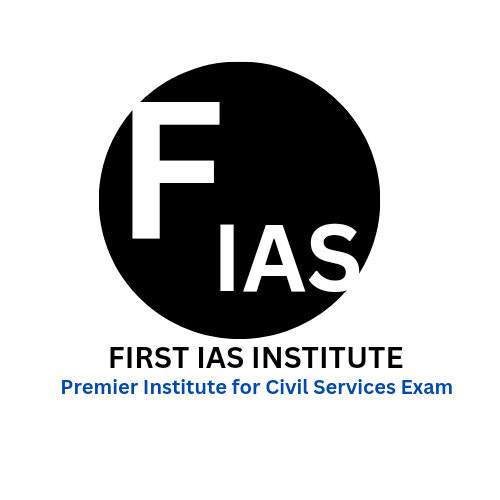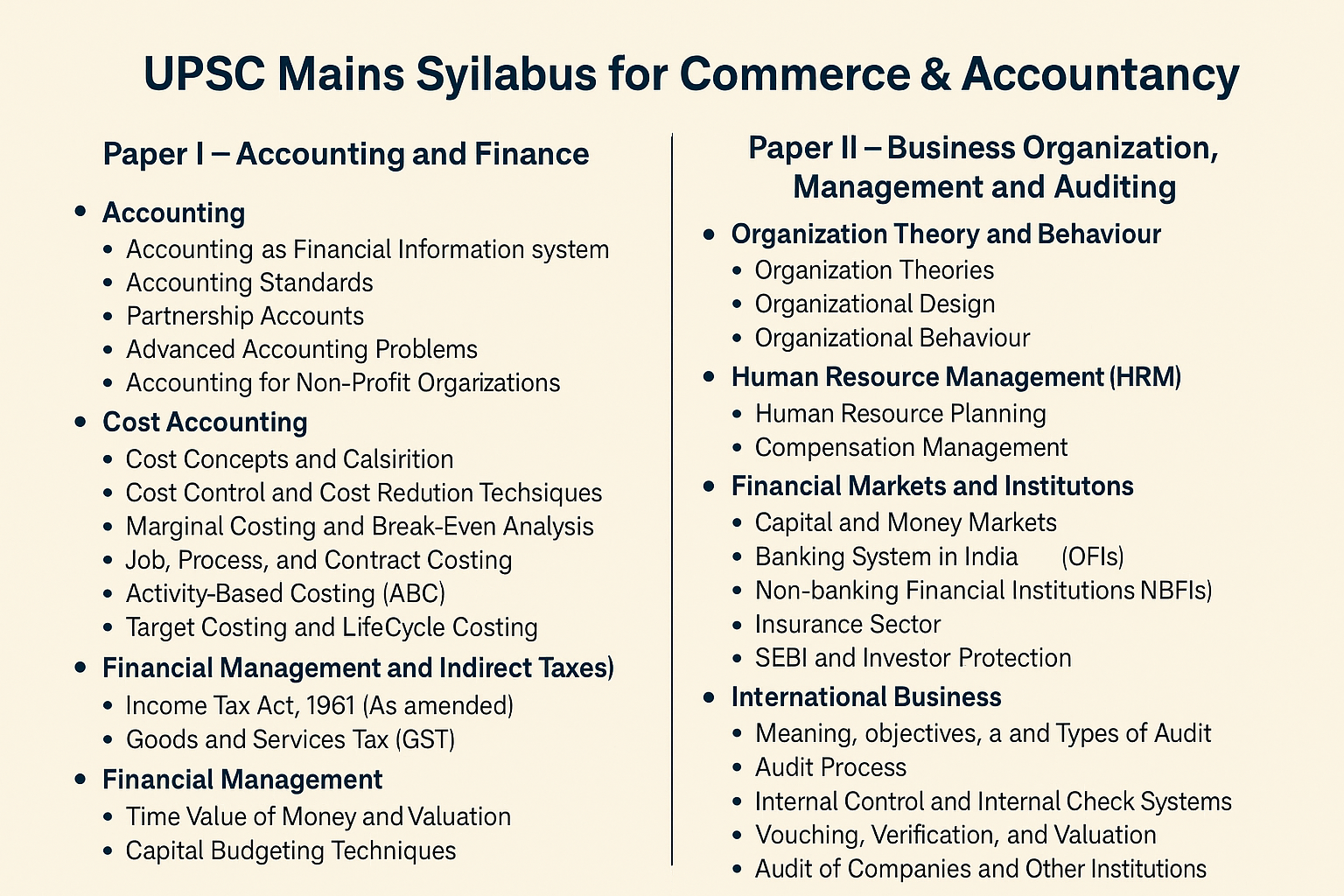UPSC Mains Syllabus for Commerce & Accountancy Optional
Comprehensive Breakdown: Paper I & II (Descriptive)
Choosing Commerce & Accountancy as an optional subject for UPSC Mains can be a strategic decision for candidates with a background in commerce, finance, accountancy, or management. The syllabus tests conceptual understanding, practical application, and analytical thinking. Below is a detailed breakdown of the syllabus:
Join WhatsApp community for Free Notifications, Updates, Study Material, Mock Tests, Internship Updates, and Current Affairs - CLICK HERE TO JOIN
Paper I – Accounting and Finance
Paper I primarily focuses on core accounting, financial management, and auditing principles.
1. Accounting
This section forms the foundation of Paper I and covers the theory and practice of accounting.
- Accounting as a Financial Information System
- Objectives of accounting
- Users of accounting information
- Role in decision-making
- Accounting Standards
- Indian Accounting Standards (Ind AS)
- International Financial Reporting Standards (IFRS)
- Conceptual Framework for Financial Reporting
- Partnership Accounts
- Admission, retirement, dissolution
- Revaluation of assets
- Accounting for goodwill
- Company Accounts
- Issue and forfeiture of shares and debentures
- Redemption and buy-back of securities
- Amalgamation, absorption, and reconstruction
- Advanced Accounting Problems
- Holding company accounts
- Liquidation of companies
- Valuation of goodwill and shares
- Accounting for Non-Profit Organizations
- Income and expenditure account
- Receipts and payments
- Balance sheet preparation
2. Cost Accounting
Understanding of cost structures and decision-making based on cost data is crucial.
- Cost Concepts and Classification
- Fixed, variable, semi-variable costs
- Product vs period costs
- Cost Control and Cost Reduction Techniques
- Budgetary control
- Standard costing
- Variance analysis
- Marginal Costing and Break-Even Analysis
- Cost-volume-profit analysis
- Application in decision-making
- Job, Process, and Contract Costing
- Activity-Based Costing (ABC)
- Target Costing and Life Cycle Costing
To Enroll in FIRST IAS INSTITUTE - Click Here
3. Taxation (Income Tax and Indirect Taxes)
This section covers both direct and indirect tax structures in India.
- Income Tax Act, 1961 (As Amended)
- Basic concepts: Assessee, income, gross total income, total income
- Exemptions and deductions
- Heads of Income: Salary, House Property, Profits and Gains from Business or Profession, Capital Gains, and Other Sources
- Clubbing of income, set-off and carry forward of losses
- Computation of taxable income of individuals and firms
- Goods and Services Tax (GST)
- GST structure and framework
- CGST, SGST, IGST – provisions and implications
- Input tax credit, returns filing
- GST’s impact on business
4. Financial Management
This section evaluates the application of financial principles for business planning and control.
- Time Value of Money and Valuation
- Present and future value
- Bond and stock valuation
- Capital Budgeting Techniques
- NPV, IRR, Payback, ARR
- Cost of Capital and Capital Structure
- Weighted average cost of capital (WACC)
- Leverage analysis
- Dividend Policy
- Theories: Walter, Gordon, MM
- Working Capital Management
- Cash, receivables, inventory, and payables
- Risk Analysis in Capital Budgeting
- Sensitivity and scenario analysis
Join WhatsApp community for Free Notifications, Updates, Study Material, Mock Tests, Internship Updates, and Current Affairs - CLICK HERE TO JOIN
Paper II – Business Organisation, Management and Auditing
Paper II emphasizes business management principles, organization behavior, industrial relations, and auditing techniques.
1. Organization Theory and Behaviour
This section delves into how organizations function and how human behavior affects productivity.
- Organization Theories
- Classical, Neo-classical, and Modern Theories
- Bureaucracy, Scientific Management
- Organizational Design
- Structure, authority, responsibility
- Span of control, delegation, centralization vs decentralization
- Organizational Behaviour
- Individual differences, perception, motivation theories (Maslow, Herzberg, McGregor)
- Personality and attitudes
- Group dynamics, leadership styles, communication
- Organizational culture and change
- Conflict and Negotiation
- Types and sources of conflict
- Resolution techniques
2. Human Resource Management (HRM)
Covers strategic aspects of managing people in organizations.
- Human Resource Planning
- Recruitment, selection, training and development
- Job analysis, performance appraisal
- Compensation Management
- Wage determination, incentives, fringe benefits
- Industrial Relations
- Trade unions, collective bargaining
- Industrial disputes, grievance handling
- Labour laws and compliance
3. Financial Markets and Institutions
This section evaluates the structure and working of financial systems.
- Capital and Money Markets
- Primary and secondary markets
- Instruments: shares, bonds, treasury bills, commercial paper
- Banking System in India
- Structure of commercial banks
- RBI and its regulatory role
- Basel norms
- Development Financial Institutions (DFIs)
- SIDBI, NABARD, NHB, EXIM Bank
- Non-Banking Financial Companies (NBFCs)
- Role and regulatory framework
- Insurance Sector
- IRDAI, LIC, private players
- SEBI and Investor Protection
- Capital market regulation
- Insider trading norms
- Corporate governance
To Enroll in FIRST IAS INSTITUTE - Click Here
4. International Business
This segment covers the management of business operations in the international context.
- International Trade Theories
- Comparative advantage, Heckscher-Ohlin theory
- Balance of Payments (BoP)
- Current and capital account
- BoP disequilibrium
- Foreign Exchange Market
- Exchange rate determination
- Hedging and currency derivatives
- International Economic Institutions
- IMF, WTO, World Bank, UNCTAD
- Globalization and MNCs
- Strategies, entry modes
- International trade policies
- Regional trade blocs
5. Auditing
Auditing involves examining the correctness of financial records and compliance with standards.
- Meaning, Objectives, and Types of Audit
- Internal, statutory, government audits
- Audit Process
- Planning, evidence collection, audit programme
- Internal Control and Internal Check Systems
- Vouching, Verification, and Valuation
- Assets and liabilities
- Audit of Companies and Other Institutions
- Audit reports and certificates
- Audit of public sector undertakings
- Recent Developments in Auditing
- Risk-based auditing
- Computer-aided audit techniques (CAATs)
- Audit under Companies Act, 2013
Join WhatsApp community for Free Notifications, Updates, Study Material, Mock Tests, Internship Updates, and Current Affairs - CLICK HERE TO JOIN
Conclusion: How to Use this Syllabus for Preparation
- Break the syllabus down into weekly targets based on strengths and weaknesses.
- Refer to standard textbooks like T.S. Grewal, M.C. Shukla for Accounting; P.L. Tulsian for Financial Management; and Indian authors for Taxation and HRM.
- Integrate current affairs (especially Budget, Economic Survey, RBI Reports) into answers wherever relevant.
- Practice answer writing with diagrams, flowcharts, and real-life corporate examples.
- Keep syllabus printout handy and do regular topic-wise revision.


 firstiasofficial@gmail.com
firstiasofficial@gmail.com
Leave a Comment